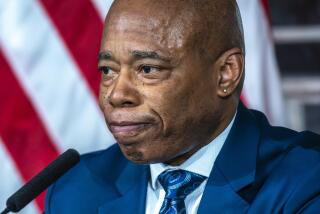COLUMN LEFT : Justice for All in the King Beating : Officers who ‘only’ watched were also breaking the law.
- Share via
If there is only one aspect of the Rodney King incident on which all involved agree, it is this: For the good of this city and all of its citizens--including the 8,300 members of the Los Angeles Police Department--every possible step must be taken to prevent such an outrage from ever happening again.
The John M. Langston Bar Assn., which represents 900 African-American lawyers in the Los Angeles area, believes that one indispensable step toward this goal must be vigorous--not minimal--prosecution of both the police officers who so viciously attacked King and those who stood by and allowed the beating to happen.
Only through a vigorous prosecution will the message be sent to police officers throughout the state that use of excessive force, or failure to intervene when colleagues use such force, will absolutely not be tolerated.
Accordingly, we believe that all of the officers at the scene of the King beating must be charged with every criminal statute that can reasonably be interpreted as applicable to their conduct.
We believe that at least three other criminal statutes apply to the behavior of various officers at the scene, and for the law to have its full deterrent effect, indictments must be sought on these charges.
We do not understand why at least two of the four officers charged with beating Rodney King were not also charged with violating his civil rights under state law.
Penal Code Section 422.6 provides that “No person, whether or not acting under color of law, shall by force or threat of force, willfully injure . . . or threaten any other person in the free exercise or enjoyment of any right because of the other person’s race, color, religion, ancestry, national origin, or sexual orientation.”
The department’s own computer-message tapes show that two of the officers earlier that evening had referred to black people as “gorillas.” Even without those tapes, the very viciousness of the beating infers a violation of King’s civil rights, because no human being could beat another so brutally unless he harbored a deep hatred for some aspect of the victim’s humanity.
King’s attorney has stated that, contrary to earlier reports, officers did make racial slurs against King as they beat him. It is difficult to imagine a situation that more clearly describes the type of hateful behavior that Section 422.6. is intended to punish. We cannot understand why this violation of the most fundamental civil right of all, to be free from persecution by armed officers of the state, should not be punished as well.
The videotape of the incident also provides evidence of the probable violation of two other criminal statutes.
Under Penal Code Section 404, “Any use of force or violence . . . by two or more persons acting together, and without authority of law, is a riot.” The courts have held that all persons who “encourage . . . give support to or countenance a riot” are principals in the commission of that riot.
Serious questions exist as to whether the bystander officers encouraged the riot against Rodney King through word or deed, or whether their very presence, which must have intimidated the many civilian witnesses (who might have come to King’s aid if only four officers were involved) amounted to support of the riot.
People have asked why there isn’t a law against officers just standing by, doing nothing, while other officers beat a man almost to death. There is such a law, and we hope that the district attorney will enforce it: Section 410 of the Penal Code states that a peace officer must exercise his authority to suppress a “an unlawful or riotous assembly.”
The district attorney has not yet brought these charges against the four primary attackers and the almost 20 bystander officers. Perhaps this is because of the greatest inherent conflict in the criminal justice system: A district attorney’s office, which depends on police cooperation to try its cases, is placed in an untenable position when called on to vigorously prosecute members of that same police force who are charged with brutality or malfeasance.
There may be valid reasons why indictments under these statutes cannot be sought. If so, given the plain and ordinary meaning of the statutes and the taped evidence of behavior that so clearly violates them, the district attorney should make those reasons known.
As long as the slightest doubt remains about whether the issues arising out of the Rodney King incident have been completely and honestly resolved, there will be no chance for improvement in police-community relations, which all of Los Angeles so desperately awaits.
More to Read
Sign up for Essential California
The most important California stories and recommendations in your inbox every morning.
You may occasionally receive promotional content from the Los Angeles Times.













